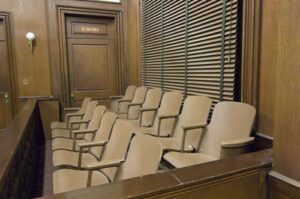 The New Jersey Supreme Court continued in relevant part: We agree with the Appellate Division that unlike in Frisby, the State here did not rely on contradictory theories and “did not try to prove that defendant committed the crime by presenting different theories based on different acts or different evidence.” As the Public Defender correctly acknowledges, “the prosecutor mainly argued during summation that the State had disproved the provocation prong by arguing that defendant, through his words, actions, and bruised ego, provoked Gaffney from the bar into the last fight with the intent to harm or kill Gaffney after the men had reconciled.”
The New Jersey Supreme Court continued in relevant part: We agree with the Appellate Division that unlike in Frisby, the State here did not rely on contradictory theories and “did not try to prove that defendant committed the crime by presenting different theories based on different acts or different evidence.” As the Public Defender correctly acknowledges, “the prosecutor mainly argued during summation that the State had disproved the provocation prong by arguing that defendant, through his words, actions, and bruised ego, provoked Gaffney from the bar into the last fight with the intent to harm or kill Gaffney after the men had reconciled.”
In summation, the State asked, “What is the provocation for this gun fight?” It then set out what it believed the evidence proved at trial: “We have shown that Officer Macchia has provoked this encounter with the intent to either kill or do serious bodily harm”; “The facts of this case do lay out that Officer Macchia provoked this”; “We ask you to pay particular attention to the self-defense exceptions of two, provoking an encounter with the purpose to kill or cause serious bodily harm”; “The facts of the witnesses will establish that Officer Macchia provoked Michael Gaffney”; “Officer Macchia wants Michael Gaffney to come outside”; “The provocation — we believe these words are clear. These words establish provocation and so self-defense fails”; “Michael Gaffney is called out by Officer Macchia and intent to call him out was to do harm, serious bodily harm to Michael Gaffney”; “The final issue in this case is what’s on the mind of Officer Macchia when he re-engages Michael Gaffney at that doorway for the final encounter, his intent to cause him harm.” This does not reflect divergent, contradictory facts or theories.
Officer Macchia was sentenced to six years in prison after his manslaughter conviction. He must serve 85% of that violent crime sentence before he can be eligible for parole.
